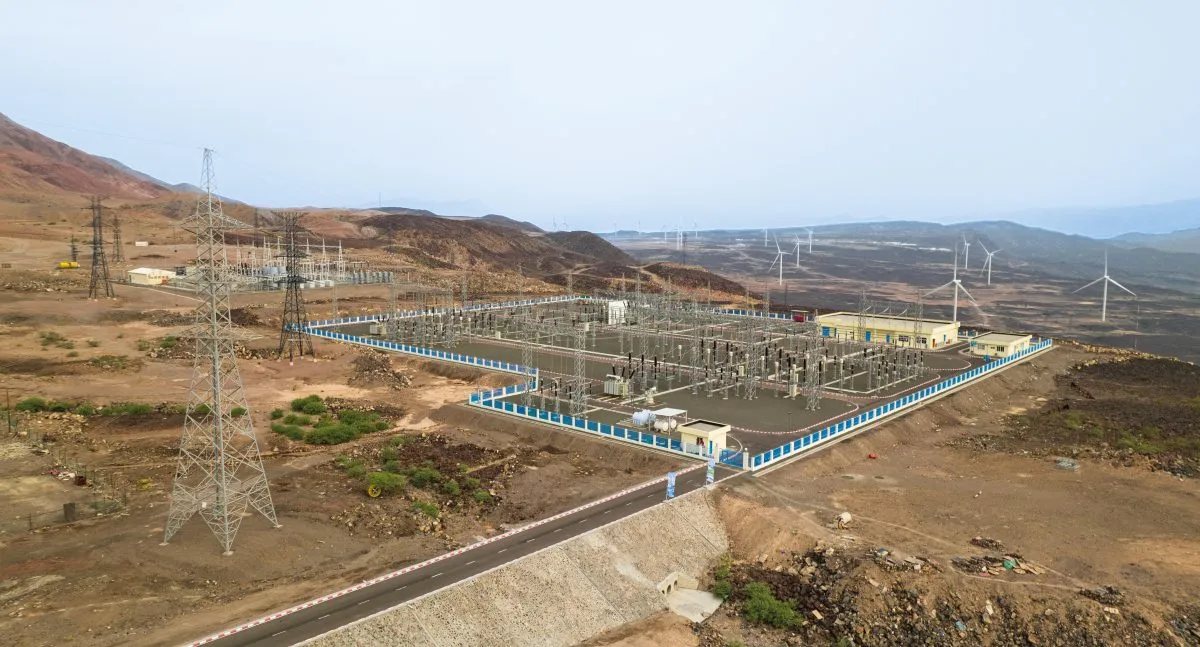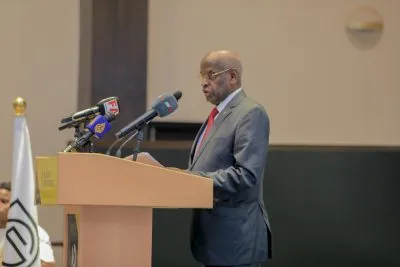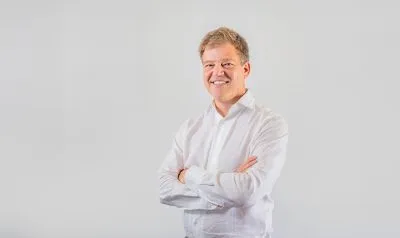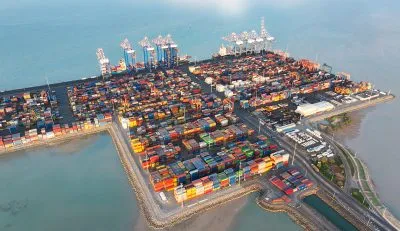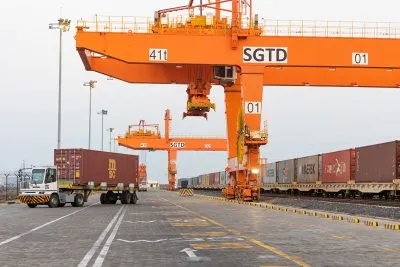The construction of this project, which is part of our energy transition, is a decisive milestone in the energy sector,” announced H.E. Ismaïl Omar Guelleh, President of the Republic, when he inaugurated the country’s first wind farm in September 2023. Located near the Bay of Ghoubet, 120 km north of the capital, it is perched at an altitude of 230 metres. This mountainous site – the windiest in the country – is now home to 17 wind turbines with a total capacity of 60 MW.
“This is an important step towards achieving our goal of producing 100% of our electricity from inexhaustible renewable sources by 2035,” continued President Guelleh.
The stakes are high for this ambitious country, which would like to improve its energy competitiveness in order to develop its industry. The country’s annual electricity consumption is currently between 100 and 140 MW – but at a cost of 23 cents per kWh, one of the highest on the continent.
The wind farm is the first large-scale initiative by an independent power producer in the energy sector since the 2015 law liberalising the sector. For the government, the aim was to open up electricity production to independent operators so as to achieve energy independence as soon as possible. It should be noted that the state-owned company Électricité de Djibouti retains a monopoly on the transmission and distribution of electricity.
Reducing energy dependence on Ethiopia
The project was developed by Red Sea Power (RSP). “This site has the best wind energy potential in Africa, alongside Tangiers in Morocco,” says François Maze, its CEO.
The farm cost around $130 million to build, which was supplied in part by an investor consortium led by RSP, consisting of the Africa Finance Corporation, an African development finance institution based in Nigeria, the Entrepreneurial Development Bank of the Netherlands, the fund manager Climate Fund Managers, and the investment company Great Horn Investment Holding, which is owned by the Djibouti Ports and Free Zones Authority.
Djibouti contributed its own funds directly to the financing of this major operation via a public-private partnership. Red Sea Power is already planning to add a further 43 MW by installing thirteen new turbines, although no contract has yet been signed.
In ecological terms, the Ghoubet wind farm will enable Djibouti to reduce its C02 emissions by around 250,000 tonnes a year. At the same time, it will enable the country to reduce its energy dependence on Ethiopia, from which it currently imports around 50% of its electricity consumption via a high-voltage line. Finally, the project has a social component. The construction of a seawater desalination plant will supply water to two neighbouring villages, to the tune of 35m3 per day.
Solar
In its bid to become the first country on the continent to produce 100% green energy by 2035, Djibouti can also draw on other ambitious projects. These include the solar power project in the Grand Bara desert, for which work began in 2020. This voltaic power station will have a capacity of 25 MW, with the possibility of an extension of up to 100 MW. The project was originally developed by France’s Engie, which withdrew in 2022 in favour of AMEA Power of the Emirates, which has signed a public-private partnership contract with the Sovereign Wealth Fund of Djibouti.
It will be the first national-scale solar power plant to meet electricity demand. “We hope to start production by the first quarter of 2025,” says Slim Feriani, CEO of the sovereign wealth fund, which holds a 25% stake in the project company. The project, like others, has been delayed by the global pandemic.
Geothermal
Because of its geographical position, at the meeting point of three major rifts – the Red Sea, the Gulf of Aden and the East African Rift – Djibouti also has a rich resource buried in its subsoil: Geothermal energy.
President Ismaïl Omar Guelleh has been quick to make this a priority. In 2013, he created the Office Djiboutien de Développement de L’énergie Géothermique. According to studies carried out by the body, the country has more than 1.1 GW of geothermal resources underground. “The potential has been confirmed and exploration has identified several zones,” says Gouled Mohamed Djama, Director of Energy at the Ministry of Energy and Natural Resources.
In particular, a power station is due to be built at Fialé Caldera, near Lake Assal, a volcanic area with chimneys, fumaroles and hot springs. Djama underlines the potential of this energy source, which does not depend on external factors such as wind or sun: “Geothermal energy can provide us with clean, constant energy. It has the potential to totally eliminate our dependence on thermal energy,” he believes.
Biomass
The country also has ambitions in biomass. A waste-to-energy plant with a capacity of 40 MW (including 5 MW reserved for its operation) is due to be built soon at Damerjog, in the south of the country. In 2020, a contract was signed with the American company CREC Energy, but the project was delayed by Covid.
Tide
The country is also carrying out pre-feasibility studies to produce tidal energy in the straits of Ghoubbet-el-Kharab (nicknamed ‘the chasm of the demons’) and Bab-el-Mandeb.
Hydrogen
Finally, the government is exploring the potential of green hydrogen, a low-carbon energy carrier. Internationally renowned companies such as Australia’s Fortescue Future Industries, the UAE’s AMEA Power and US giant CWP Global have already begun pre-feasibility studies to produce hydrogen for export. In December 2023, the Republic of Djibouti signed up to the African Green Hydrogen Alliance.
The country’s formidable prospects in terms of renewable energy means that Slim Feriani can look to the future with confidence. “The objective for 2035 is to be self-sufficient in energy production,” he says. “We should get there before then. The idea would be to have an energy mix made up of solar and wind power, with some geothermal energy. There’s also a project to convert waste into energy. It’s a question of ‘when’, not ‘if’. The political will is there,” he assures us.
Order of priority
While lowering the cost of electricity remains one of the major challenges facing the country as it seeks to get its industry off the ground, things need to be done in order, according to Djama at the Ministry of Energy and Natural Resources. “The priority is to convert our current consumption to renewable energy, then to increase the rate of access to electricity, particularly in the regions, and finally, the cost stage will come next,” he says. “We need to take a gradual approach to avoid price fluctuations. We will always be in the quest to produce more to meet growing demand.”
In his view, the country’s energy consumption could double, or even triple, with the completion of projects such as the launch of the industrial port site at Damerjog, in the south of the country. “To meet this demand, there should be an increase in the number of independent energy producers in the various sectors – wind, solar and geothermal,” he believes.
This specialist is betting heavily on the development of biomass and geothermal projects. “If these renewable energy sources materialise in the next three years, we will really be able to take the decision to drastically lower the price of electricity, because we would find ourselves in a situation of energy abundance,” he continues.
In the meantime, the director is calling for people to be more aware of their energy consumption, as air conditioning often causes bills to soar.
Lowering the cost of electricity is a major challenge for Djibouti, but the benefits would be substantial. According to the World Bank, reducing the cost of electricity and telecommunications could increase real GDP by 39.1% by 2030, generate 23,000 jobs and considerably boost household incomes, while reducing poverty. The country has everything to play for.
Want to continue reading? Subscribe today.
You've read all your free articles for this month! Subscribe now to enjoy full access to our content.
Digital Monthly
£8.00 / month
Receive full unlimited access to our articles, opinions, podcasts and more.
Digital Yearly
£70.00 / year
Our best value offer - save £26 and gain access to all of our digital content for an entire year!

 Sign in with Google
Sign in with Google 